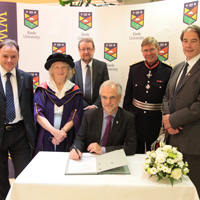Public Engagement Vital to Keele’s Mission

Keele University has signed the National Co-ordinating Centre For Public Engagement’s (NCCPE) Manifesto for Public Engagement, sharing its commitment to local communities, enterprise and stakeholders locally, nationally and internationally.
During a graduation lunch on campus today, 14th July 2016, Vice Chancellor Professor Trevor McMillan shared the institutions view of public engagement and why it has signed the manifesto:
“At Keele, we believe deeply in the capacity of education positively to improve the prospects of individuals, communities and societies, locally, nationally and internationally. We also strive fully to achieve the impact of the research we do by monitoring its social, economic, health, environmental and cultural benefits. For both of these reasons, public engagement is vitally important to Keele’s mission as a University which is committed to sharing and widely communicating our excellence in research and teaching. We are proud to sign up to the Manifesto of the NCCPE because it demonstrates our determination to develop, share and, wherever possible, co-produce new kinds of knowledge; it also demonstrates our commitment to develop positive, socially beneficial relations between the Keele community of students and academic staff, and the range of communities, partners and stakeholders to whom they listen, and with whom they interact.”
The Vice Chancellor addressed those attending the Graduation lunch, including Honorary Graduates Professor Anne Power CBE and former Vice-Chancellor ProfessorNick Foskett, Lord-Lieutenant of Staffordshire Ian Dudson and the Chancellor Jonathan Porritt.
Keele’s approach to Public Engagement is demonstrated by one of its key strategic aims for 2015-2020, ‘To contribute positively to the society, economy, culture, health and well-being of the communities we serve’.
Collaborating with local communities, enterprise and the third sector, as well as developing volunteering initiatives involving students and staff, are critical to this strategic aim, spanning Keele’s networks within the NHS, research and training networks, arts and cultural programmes and creative industries and social enterprise.
Examples of Keele’s public engagement include:
- Through our world-leading research in Primary Care Health Sciences, we engage the public to develop primary health care solutions which improve the health of communities in North Staffordshire and beyond
- Our work in the Life Sciences, and in particular parasitology, is committed to find cutting edge solutions to parasite-borne diseases and food security, the importance of which is communicated through outreach to schools and colleges.
- Prize- winning outreach to schools and colleges within Astrophysics, translating world-leading research into the stars and planets into an inspiration to attract the next generation of scientists.
- Our internationally leading research in sustainability, in both the natural and social sciences, has been translated into award winning public engagement and school outreach activity in sustainability and environmental education, increasing awareness of sustainability issues and the importance of developing more sustainable approaches to energy use, with a particular focus on disadvantaged communities
- Our Cultural Animation and Social Innovation Centre (CASIC) has been central to AHRC’s Connected Communities programme and, using methods of artistic engagement, has worked extensively with a wide-range of communities, assisting them in their self-understanding, resilience, and the discovery of solutions to entrenched problems.
- Keele’s Gerontologists have for many years been at the centre of research and practice to improve the lives of older people; their Live Age festival in the city of Stoke-on-Trent promoting cultural engagement for older people will be in its third consecutive year of delivery in 2016.
- The Community Legal Outreach Collaboration Keele (CLOCK) is an innovative and exciting initiative launched in 2012 by the Law School. By working with a number of partner organisations, CLOCK enables Keele Law students to provide vital help and support to disadvantaged communities through legal research, policy work and community legal education, while further strengthening key employability skills.
- Keele researchers in Criminology and Law work on community security through knowledge exchange programmes supported by the Staffordshire Police Knowledge Fund; social psychology research offers policy advice on crowd management to police forces nationally and internationally.
- Keele is committed to developing its researchers as skilled engagers of the public through its Engaged Researcher Toolkit.
You can read more about Keele’s research impact here

